
The Shoah and the Second Generation:
Father and Son: Maus's
"Story Within the Story"

 |
The Shoah and the Second Generation:Father and Son: Maus's |
 |
| Click here for a printable version of this hypermedia project. |
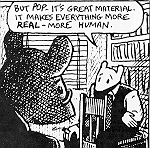
Maus's "story within the story" focuses on the relationship between the author, Art Spiegelman, and his father Vladek. Meshed with panels dealing with the Holocaust, the vignettes center on Vladek's idiosyncrasies, his estranged relationship with Art, and the latter's mental breakdown. The inclusion of such elements adds a deeply personal and autobiographical dimension to Maus, and creates more humane personages ripe of character and moral flaws, as exemplified in the imperfect figure of the Holocaust survivor, Vladek.
Vladek's inability to comprehend his son opens the book, as he disregards Art's crying and pain, choosing to lecture him on the hardships of the Holocaust. To Vladek, such unimportant incidents are unworthy of time and attention. He is unable (or unwilling) to demonstrate sympathy toward his son, as a result of analyzing events through the lens of his experiences during the Holocaust. His whole existence was changed, and afterwards remained measured, by the Holocaust. In a symbolic sense, the Shoah stopped time for him. Although he survived the event, living until 1982, his life seemed frozen in time. He was trapped in an existence unlike the one he enjoyed before the Nazi occupation, and often desired to return to previous times. Such dichotomy is best found in his condition regarding his sons, as exemplified by the "Art's Father, Vladek's Son" section of the Maus CD-ROM:
After the war, everything was over, even the possibility of a normal upbringing. Raising his first son, Vladek had been a young father with a buoyant sense of the future. Raising his second son, his second "only son" he was an old man, fretting over his insecure present when he was not fixated on his desolated past.1
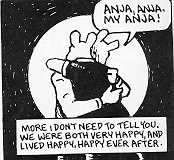
It is precisely this time warp that concludes the book, as Vladek mistakenly calls Art by his deceased brother's name, Richieu, after telling Art that he already knows the rest of the story, "More, I don't need to tell you. We were both very happy, and lived happy, happy ever after." On his deathbed, Vladek makes one last subconcious effort to give his life a happy ending, a false sense of security both Art and the Maus audience know is wholly fabricated. This assertion negates the reality of Vladek and Anja's troubled existence after the Liberation, evident by her suicide (as discussed below), but highlights Vladek's inability to comprehend, realize, and accept change, typical of many survivor parents.
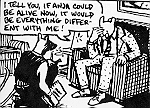
Vladek's subsequent marriage, to another Holocaust survivor, seems doomed from the beginning. Vladek continually compares Mala to Anja, a clear sign he remarried for the sake of company, not love. The union seems to be in harmony with a trend among survivors to remarry, "motivated by a desire to avoid the mourning process," and yielding matrimonies "characterized by lack of closeness or…a hostile stalemate."2 In Maus's case, the latter case seems to be the norm, as Art's attempts to interview his father are often interrupted by Vladek's complaints about Mala.

The ghost of Anja's suicide, the upshot of a bitter life full of painful Holocaust aftereffects and an uneasy family atmosphere, permeates the book. The incident, as illustrated on pages 100-103, forced father and son to attempt to strengthen their bond and relationship, which in turns foments Art's desire to write Maus as a cathartic process. Not having experienced the Holocaust, Art can now lay claim to surviving his mother's suicide, an impacting, life-altering episode of his own. Her death shapes Art's life much in the same way the Holocaust alters Vladek. However, as discussed below, they have different methods of coming to terms with the pain.
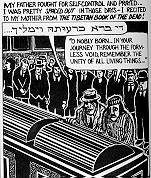
Despite the mutual pain and reliance on each other, Vladek and Art have divergent manners in which to commemorate the incident and relieve the pain. Prisoner on the Hell Planet, Art's chosen method of catharsis, exposed his pain to a wide audience after being published in Short Order Comix #1 (1973). The four pages devoted to the incident place Art in a dark underworld, full of unsympathetic figures eager to blame him for his mother's breakdown. In addition, despite the fact that his remembrance tactics differ from Vladek's--note, for example, how father recites Jewish prayers while son chooses the Tibetan Book of the Dead--he undergoes his own personal Holocaust, as evidenced by his concentration camp uniform-like attire. Vladek, in contrast, suppressed his feelings, only burning Anja's diaries as a manner in which to ease the suffering. This action, however, could be read as a (failed) attempt to deny the Holocaust, adding to his perennial unhappiness.
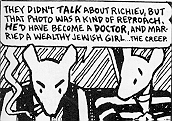
Another source of friction between Art and Vladek is Richieu, the deceased firstborn. Art's feelings are those of a typical second generation survivor, and as such have been the topic of psychological studies. Children born to Holocaust survivors, writes Bergman, "were slated to replace offspring (who died in the Holocaust)…were made especially responsible."3 Spiegelman voices his displeasure on the panel shown at right, saying he often "felt like competing with an ideal child." This feeling of jealousy touches on the troublesome lives of the survivors' offspring. Sandra Williams writes these "kids live their own existences, and also those of their dead siblings."4 Vladek seems to share this thought, as he often transposes Art's and Richieu's names. The pattern can be seen throughout the novel, as illustrated by the two examples below.
|
Throughout the novel (and most of his post-Holocaust life) Vladek makes an almost seamless transition between Art and Richieu when narrating the latter's events; it seems as if he regards Vladek as a "Richieu replacement," not as a separate person. The top panel shows an aging father's desire to care for his son, as he attempts to clothe his (now thirty-something) kid. The act can be read as an effort to turn back the clock and return to pre-War Europe, to an epoch when the possibility of a normal, happy life was still present. The bottom drawing demonstrates Vladek's confusion between Art and Richieu. Despite having spent a considerable amount of time with Art narrating his Holocaust experiences (or perhaps because of it, having triggered his remembrances of Richieu), Vladek calls Art by his dead brother's name, attesting to his aloofness in regards to time, his desire to return to previous times, or a combination of both. |
 
|
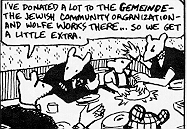 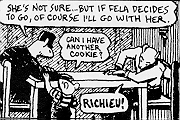
|
Two of the most interesting panels depict imaginary events regarding Richieu. The drawings to the left do not present the perfect child Vladek speaks about, but instead a normal toddler who is far from angelic. Spiegelman complains in several instances throughout the book of his difficulties in competing with a sibling he did not know, a flawless child who perished in the ghetto. By drawing occasions that reflect a normal kid capable of getting on his parents' nerves, Art (sub)consciously attacks the memory of his dead brother as a cry against the unfair contrasts that shaped his childhood. The Maus CD-ROM includes the audio component of Vladek's interview, from which most of the material for the work was based. Interestingly enough, no mention is made of either one of the incidents shown at left. Given Art's professed perfectionist nature in several portions of the novel, one could safely assume the episodes were added as secondary elements to the larger story in order to ease his pain as a child born after the Holocaust, sometimes thought to symbolize the dead sibling or replace him entirely. |

Art and Vladek's relationship also illustrates the presence of a "messianic task" in the lives of second generation survivors, which includes a "need to justify their existence".5 This desire to honor is channeled in different ways; some survivors engage in legal battles to recover their forefathers' Swiss-seized possessions while others compose Web pages. Spiegelman chooses to do so by composing Maus, but realizes his ambitious task need not result in an explanation for his existence, but rather as a means of closing the abyss in the relationship with his father. By doing so, he manages to accomplish a manageable feat, as opposed to his previous one, which ends after he realizes that "no matter what I accomplish, it doesn't seem like much compared to surviving the Holocaust."
Despite wanting to grow closer to his father and enjoy the type of relationship they did not have before his death, Spiegelman nonetheless incorporates both positive and negative aspects of his relationship with Vladek into the novel. His desire to honor and pay tribute to Vladek's life does not prompt the omission of his father's faults or passages of arguments between the two. Among other things, Art's visit to the psychiatrist shows how Vladek is able to fill him with awe and guilt, rage and respect, pity and compassion, reducing him to child status again. Art is unable to have a perfect relationship with Vladek, even after his father has passed away; the ghost of their troubled past remains quite palpable. The level of detachment and estrangement reached throughout the course of their lives is too large an obstacle, perhaps seen best by his usage of "Vladek" instead of "dad" when referring to his father throughout his work.
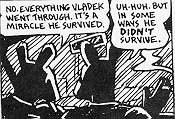
As discussed above, despite making his best efforts to paying homage to his father, Art is quite conscious of Vladek's negative qualities, some of which are a result of not "truly surviving" the Holocaust. As Art tells his wife Françoise, in "some ways (Vladek) did not survive." This, however, does not deter him from complaining about his father's stinginess, siding with Mala when she complains Vladek is more attached to things than people, or cracking a joke about curfew. Such incidents purposely fail to paint Vladek as a larger-than-life, flawless figure, shattering the mystical idea of "living happily everafter" he claims in the book's conclusion.

Perhaps the most telling issue, however, is Art's reaction to Vladek's confession of burning Anja's diaries. Two different perspectives are displayed, as the former wants (and needs) to remember and record. The latter, on the other hand, tries to heal by forgetting about the Holocaust. The sentiment is repeated on page 98, as Vladek melancholically states "such things of war, I tried to put out of my mind." The episode presents a stark division between generations, as one tries to reach out and record what the other is attempting to forget. Art is unable to understand his father's motivations, and as a result, grows infuriated at him. This inability is twofold; the first cause is his incapacity to relate (not having experienced the Holocaust), and the second, is his divergent personality. Whereas he preferred to draw a comic on Anja's suicide to let the pain flow, his father chose to eliminate by burning the diaries, in a vain attempt to have the fire also consume the pain.
It is this element of inability to comprehend that hampers the relationship between father and son, as demonstrated by the examples above. Some of the situations displayed in Maus can be found in second generation survivors as a group. The next section takes this last incident a step further, as the analysis focuses on the children of survivors and their means of representing the Holocaust and paying homage to their forefathers. The overall trends and traits—some taken from psychological profiles—are then applied to Spiegelman's Maus.
| Introduction |
Graphical Representation: The Unusual Structure of Maus |
| Second Generation Trauma: The Post-Holocaust Experience | Conclusion and Bibliography |